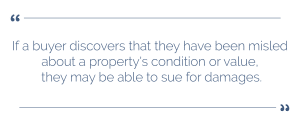

Updated on April 8, 2024
Real estate transactions can be complex, especially for first-time buyers or sellers. As you navigate the process, it is essential to understand the difference between puffing and misrepresentation. These terms refer to the way information is presented during a real estate transaction and can have significant consequences. Let’s explore the definitions, consequences, and what to do if you find yourself a victim of either. One deals with facts (misrepresentation) the other may deal more within option (puffing).
These terms, pivotal in real estate negotiations, outline the boundary between persuasive marketing and deceptive practices. Puffing, a form of sales hyperbole, and misrepresentation, a breach of factual integrity, play distinct roles in shaping buyer and seller expectations. Their differentiation not only affects the immediate transaction but also impacts broader market perceptions and legal standards.
Puffing is a marketing strategy used by real estate agents to exaggerate the benefits or features of a property. It involves subjective opinions or vague statements that are not considered factual representations. Puffing is legal and is often used to make a property more appealing to potential buyers.
Examples of puffing include statements like “this is the best house on the block” or “this property has great potential.” These statements are considered puffery because they are opinions rather than statements of fact. Puffing is not considered fraudulent because it does not involve making false statements about the property’s condition or value. It is totally subjective which house is the best house on the block.
In practical terms, puffing is widespread in sales and marketing, where the emotional appeal of a home is highlighted. For instance, calling a garden a “paradise” aims to stir emotions and visions of happiness rather than serve as a factual description of the space.
While puffing is legal, it operates within ethical boundaries that aim to prevent misleading potential buyers. Buyers should approach these statements with a critical mindset, recognizing them for what they are: efforts to enhance the appeal of a property. It’s important for buyers to verify any claims independently to ensure they have a clear understanding of what they are considering purchasing.
Puffing targets the aspirations of buyers, trying to connect on an emotional level rather than through factual accuracy. This tactic underscores the need for buyers to differentiate between the emotional allure and the actual qualities of a property.
Buyers should be aware that puffing is part of the sales process. Engaging with properties critically, asking for specifics, and verifying information is crucial in making informed decisions.

Misrepresentation, on the other hand, involves making false statements or providing misleading information about a property. Unlike puffing, misrepresentation is improper and can lead to serious consequences for the party responsible.
Common instances of misrepresentation might include incorrect claims about a property’s condition, such as falsely stating a roof is new when it’s not, or not disclosing problems like mold or structural issues. Whether these misrepresentations are made knowingly or due to negligence, the outcome can negatively affect the transaction and harm the involved parties.
For buyers, it’s critical to conduct thorough due diligence, including inspections and verifying information provided by sellers or agents. Sellers, on the other hand, must ensure all disclosures about the property’s condition are accurate and complete to avoid potential legal issues.
The consequences of puffing and misrepresentation differ significantly. Puffing, being a subjective exaggeration, typically does not lead to legal action. However, it can lead to disappointment for buyers who may have had unrealistic expectations based on the agent’s statements.
Misrepresentation, on the other hand, can result in legal action and financial penalties. If a buyer discovers that they have been misled about a property’s condition or value, they may be able to sue for damages. In some cases, misrepresentation can also void the sale contract, leading to further complications and potential legal disputes.
If you believe you have been a victim of misrepresentation in a real estate transaction, it’s essential to take action promptly. Here are steps you can take:
1. Document Everything: Keep records of all communications, advertisements, and documents related to the transaction.
2. Consult with an Attorney: Seek legal advice to understand your rights and options for recourse.
3. Notify the Other Party: Inform the party responsible for the misrepresentation in writing and request a resolution.
4. Consider Mediation or Arbitration: If negotiations fail, consider alternative dispute resolution methods such as mediation or arbitration. In fact, in California most contacts require mediation before a lawsuit before you file a lawsuit in order to preserve there right to seek prevailing party attorneys’ fees.
5. File a Lawsuit: If necessary, file a lawsuit against the party responsible for the misrepresentation to seek compensation for damages.
While puffing relies on subjective optimism to highlight a property’s potential, misrepresentation crosses into the realm of deceit, presenting false information about a property’s condition. Each carries its implications for buyers and sellers, shaping the trust and decisions that form the foundation of any real estate transaction.
For buyers, the journey involves recognizing the fine line between marketing enthusiasm and factual accuracy. It’s essential to approach each property with a critical eye, validating claims through independent inspections and due diligence.
Sellers, on the other hand, must tread carefully to maintain integrity and transparency. Accurate disclosure of property conditions not only fulfills legal obligations but also builds a reputation of trustworthiness and reliability in the market.
If you believe you have been a victim of misrepresentation, seek legal advice to understand your rights and options for recourse. The Los Angeles real estate attorneys at Schorr Law handle cases like this across the state of California and can take a look at your situation, help determine whether or not you are dealing with real estate fraud, and help you find a solution for your property. Call us today at 310-954-1877 or contact us here.